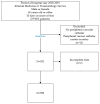Non-Adherence to Peripheral Venous Catheter Care Protocols Significantly Decreases Patient Safety and Impacts Costs: A Retrospective Observational Study
- PMID: 39201118
- PMCID: PMC11354159
- DOI: 10.3390/healthcare12161558
Non-Adherence to Peripheral Venous Catheter Care Protocols Significantly Decreases Patient Safety and Impacts Costs: A Retrospective Observational Study
Abstract
In the healthcare field, the effective implementation of clinical protocols is crucial to ensuring patient safety and well-being. In this context, this study evaluates nurses' adherence to the maintenance and replacement protocol of peripheral venous catheters (PVCs) in a university hospital in Spain, examining the impact of compliance with the protocol on the loss of PVCs and on patient safety in addition to analyzing the related costs. A retrospective observational study was conducted with 590 patients who were admitted in 2018 and 2019. The chi-square test or Fisher's exact test, as appropriate, was used to see the association between the study variables; with the dependent variable being the loss of PVCs (including, as a dependent variable, the loss of PVCs before 48 h). The patients' electronic and physical medical records were reviewed to analyze nursing interventions related to the management of PVCs. A total of 24% of patients experienced PVC loss within the first 24 h after insertion. Failure to comply with the protocol resulted in 80% more catheter loss and increased the cost of cannulation by 46.84%. Low compliance with PVC care protocols significantly increases the risk of catheter loss, suggesting the need for increased training and strict protocol implementation. The findings emphasize the critical role of nursing in ensuring patient safety through adherence to evidence-based protocols. Continuing education and diligent protocol implementation are essential to reducing healthcare costs and improving patient outcomes.
Keywords: NANDA-I; adherence; cost; nursing interventions; patient safety; peripheral venous catheter; protocol; quality.
Conflict of interest statement
The authors declare no conflict of interest.
Figures





References
-
- World Health Organization World Alliance for Patient Safety: Forward Programme 2005. World Health Organization. [(accessed on 15 May 2020)]. Available online: https://iris.who.int/handle/10665/43072.
-
- EPINE Study the Prevalence of Infections (Healthcare-Related and Community-Acquired) and Antimicrobial Use in Acute Care Hospitals in Spain 2021. EPINE-EPPS Studio nº 31: 2021. Ministry of Health, Government of Spain; Spanish Society of Preventive Medicine, Public Health ang Hygiene. Madrid, Spain 2021. [(accessed on 15 May 2020)]. Available online: https://epine.es.
-
- Martínez Ortega C., Suárez Mier B., Del Río Pisabarro C., Cantero M., Llinás M. Zero Phlebitis Program. Spanish Agency of Medicines and Health Products (AEMPS); Madrid, Spain: 2019.
-
- National Study of Adverse Effects Linked to Hospitalization. Ministry of Health and Consumer Affairs; Madrid, Spain: 2006. ENEAS 2005.
LinkOut - more resources
Full Text Sources

